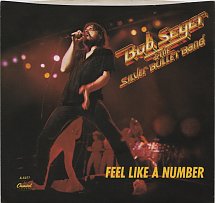
Robert Clark Seger is an American singer, songwriter, and musician. As a locally successful Detroit-area artist, he performed and recorded as Bob Seger and the Last Heard and The Bob Seger System throughout the 1960s, breaking through with his first album, Ramblin' Gamblin' Man in 1969. By the early 1970s, he had dropped the 'System' from his recordings and continued to strive for broader success with various other bands. In 1973, he put together the Silver Bullet Band, with a group of Detroit-area musicians, with whom he became most successful on the national level with the album Live Bullet (1976), recorded live with the Silver Bullet Band in 1975 at Cobo Hall in Detroit, Michigan. In 1976, he achieved a national breakout with the studio album Night Moves. On his studio albums, he also worked extensively with the Alabama-based Muscle Shoals Rhythm Section, which appeared on several of Seger's best-selling singles and albums.

"(Just Like) Starting Over" is a song written and performed by John Lennon from the 1980 album, Double Fantasy. It was released as a single on 24 October 1980 in the United Kingdom, with Yoko Ono's "Kiss Kiss Kiss" as the B-side. It reached number one in both the US and UK after Lennon was murdered on 8 December 1980. It was Lennon's final single released in his lifetime.

Night Moves is the ninth studio album by American rock singer-songwriter Bob Seger, and his first studio album to credit the Silver Bullet Band. The album was released by Capitol Records on October 22, 1976. Although the front cover only credits backing by the Silver Bullet Band, four of the nine songs on the album feature backing by the Muscle Shoals Rhythm Section.

Nine Tonight is a live album by American rock band Bob Seger & The Silver Bullet Band, released in 1981. The album was recorded at Cobo Hall in Detroit, Michigan, in June 1980 and at the Boston Garden in Boston, Massachusetts in October 1980. With the exception of three tracks — "Nine Tonight", "Tryin' To Live My Life Without You" and "Let It Rock" — the album is composed entirely of songs drawn from Seger's three previous studio albums. Only "Let It Rock" was repeated from the previous live album Live Bullet. "Tryin' to Live My Life Without You" was released as a single and peaked at number five on the Billboard Hot 100 in the US. The album's title track was originally recorded for the Urban Cowboy soundtrack album.
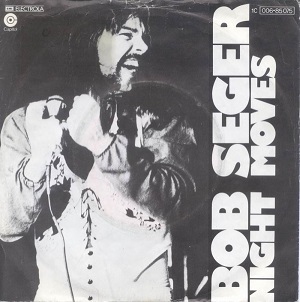
"Night Moves" is a song by American singer-songwriter Bob Seger. It was the lead single from his ninth studio album of the same name (1976), which was released on Capitol Records. Seger wrote the song as a coming of age tale about adolescent love and adult memory of it. It was based on Seger's own teenage love affair he experienced in the early 1960s. It took him six months to write and was recorded quickly at Nimbus Nine Studios in Toronto, Ontario, with producer Jack Richardson. As much of Seger's Silver Bullet Band had returned home by this point, the song was recorded with several local session musicians.
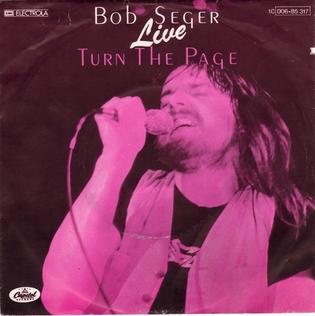
"Turn the Page" is a song originally recorded by Bob Seger in 1971 and released on his Back in '72 album in 1973. It was not released as a single until Seger's live version of the song on the 1976 Live Bullet album got released in Germany and the UK. The song became a mainstay of album-oriented rock radio stations, and still gets significant airplay on classic rock stations.

"Like a Rock" is a song written by American singer-songwriter Bob Seger. The single peaked at No. 1 on the US Billboard Mainstream Rock Tracks.

"Against the Wind" is a song written and recorded by the American singer-songwriter Bob Seger for his eleventh studio album of the same name. It was released as the second single from the album in April 1980 through Capitol Records. Seger recorded the ballad during a two-year process that begat his eleventh album; it was recorded with producer Bill Szymczyk at Criteria Studios in north Miami, Florida. Sonically, "Against the Wind" is a mid-tempo soft rock tune with piano backing. It was recorded with Seger's Silver Bullet Band, and features backing vocals from Eagles co-frontman Glenn Frey.
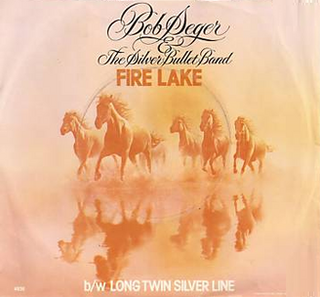
"Fire Lake" is a song written and recorded by the American musical artist Bob Seger. He had planned to record "Fire Lake" for his 1975 album Beautiful Loser, but the track was not finished. The song had been partly written years before, in 1971, and was finally finished in 1979 and released in 1980 on Seger's album Against the Wind. The single reached number 6 on the Billboard Hot 100. A live version of the song appeared on the album Nine Tonight, released in 1981.

"Urgent" is a song by the British-American rock band Foreigner, and the first single from their album 4 in 1981.

"Old Time Rock and Roll" is a song written by George Jackson and Thomas E. Jones III, with uncredited lyrics by Bob Seger. It was recorded by Seger for his tenth studio album Stranger in Town. It was also released as a single in 1979. It is a sentimentalized look back at the music of the original rock 'n' roll era and has often been referenced as Seger's favorite song. The song gained renewed popularity after being featured in the 1983 film Risky Business. It has since become a standard in popular music and was ranked number two on the Amusement & Music Operators Association's survey of the Top 40 Jukebox Singles of All Time in 1996. It was also listed as one of the Songs of the Century in 2001 and ranked No. 100 in the American Film Institute's 100 Years...100 Songs poll in 2004 of the top songs in American cinema.

"Roll Me Away" is a song written by American rock artist Bob Seger on the album The Distance by Bob Seger and the Silver Bullet Band. The song was used as Seger's opening song on his Face the Promise tour in 2006–2007, his first tour in a decade.
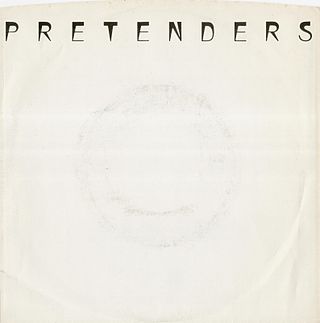
"Middle of the Road" is a single that appears on The Pretenders' album Learning to Crawl.

"Rock and Roll Never Forgets" is a song written by American singer-songwriter Bob Seger. The song first appeared on Seger's ninth studio album Night Moves (1976). The song was released in early 1977 as the third and final single from the album. The song peaked at No. 41 on the Billboard Hot 100, charting less successfully than the previous two singles. Nevertheless, "Rock and Roll Never Forgets" remains popular with Seger fans, and has become a staple of classic rock radio.

"Mainstreet" is a song written and recorded by Bob Seger & The Silver Bullet Band. It was released in April 1977 as the second single from the album Night Moves. The song peaked at number 24 on the U.S. Billboard Hot 100 and has become a staple of classic rock radio; it also reached number one on the Canadian Singles Chart.

"Hollywood Nights" is a song written and recorded by American rock artist Bob Seger. It was released in 1978 as the second single from his album, Stranger in Town.

"Still the Same" is a 1978 song written and recorded by the American singer Bob Seger. It hit #4 on the U.S. Billboard Hot 100 chart.

Ride Out is the seventeenth studio album by American rock singer–songwriter Bob Seger. The album was released on October 14, 2014.

"Beautiful Loser" is a song written and recorded by American rock artist Bob Seger. It was the title track on his 1975 studio album Beautiful Loser. The single just missed inclusion on the US Top 100, but became more widely known when it was included on Seger's breakout album, 'Live' Bullet (1976), where it was paired with "Travelin' Man".

"Her Strut" is a song written by Bob Seger that was first released on his 1980 album Against the Wind. It was also released as the B-side of his single "The Horizontal Bop." The song was inspired by feminist icon Jane Fonda.
